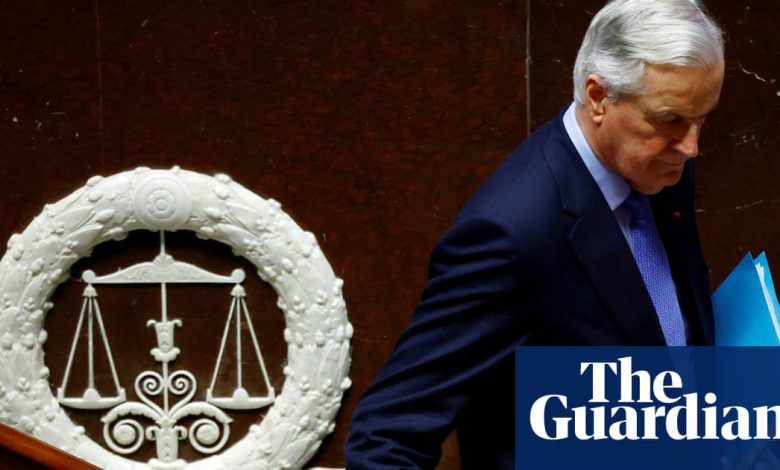French PM to resign after government falls while Macron seeks solution to crisis | France

French Prime Minister Michel Barnier is expected to resign on Thursday, a day after his new government was formed the first to be ousted by a vote of no confidence for more than 60 years and only three months after he took office – a record overthrow.
Barnier should be president Emmanuel Macron with the resignation of his government on Thursday morning. The president will address the nation Thursday night, Elisha said.
“I can tell you that it will remain an honor for me to serve France and the French with dignity,” Barnier said in his final speech before the vote. “This vote of no confidence … will make everything more serious and more difficult. I am sure of that.”
Barnier’s defenestration comes after snap parliamentary elections this summer, which led to a hung parliament with no party having an overall majority and the far right holding the key to the government’s survival.
Macron has the unenviable task of choosing a viable successor with more than two years left in his presidency, with some – though not all – opponents calling for him to resign. The fractured parliament will remain unchanged as new legislative elections cannot be held until at least July.
The no-confidence motion tabled by the hard-left in the National Assembly comes amid a standoff over next year’s austerity budget, after the prime minister pushed through a social security funding bill without a vote on Monday.
With the decisive support of Marine Le Pen’s far-right National Union, a majority of 331 MPs in the 577-member chamber voted to topple the government.
Speaking on TF1 television after the vote, National Rally leader Marine Le Pen said “we had a choice to make and our choice is to protect the French” from the “toxic” budget. Le Pen also accused Macron of being “largely responsible for the current situation”, adding that “the pressure on the president of the republic will become stronger and stronger”.
It was the first successful vote of no confidence since the defeat of Georges Pompidou’s government in 1962, when Charles de Gaulle was president.
Macron flew back to Paris just before the vote after finishing a three-day state visit to Saudi Arabia, apparently a world away from the domestic crisis. He walked earlier on Wednesday across the desert sands of Al-Ula Oasis, marveling at ancient landmarks. After landing in Paris, he headed directly for the Elysée Palace.
“We are now calling for Macron to go,” Mathilde Pano, head of the hard-left France Unbowed (LFI) parliamentary faction, told reporters, calling for “early presidential elections” to resolve the deepening political crisis.
Careful not to cry foul over the fall of the government, Le Pen said in a television interview that her party – once a new prime minister is appointed – would “let them work” and help create “a budget that is acceptable to everyone “.
But in an editorial, Le Monde said Le Pen risked upsetting her own supporters, such as pensioners and business leaders, by bringing down the government.
“Within minutes, she broke the normalization strategy she had consistently followed,” the daily said.
Laurent Vauquiez, the leader of right-wing MPs in parliament, said the far right and hard left were responsible for the no-confidence vote, which would “plunge the country into instability”.
Candidates for the post of prime minister are few, but loyalist Defense Minister Sebastien Lecorneux and Macron’s centrist ally Francois Bayrou are possible contenders.
On the left, Macron could turn to former Socialist prime minister and interior minister Bernard Cazeneuve, a contender in September.
Barnier was the fifth prime minister since Macron came to power in 2017, each holding successively shorter terms. Given the turbulence, the new candidate risks an even shorter term than Barnier, whose tenure was the shortest of any administration since the beginning of the Fifth Republic in 1958.
Macron could quickly appoint a new prime minister, several sources told AFP. A source close to Macron said the president, who has made time for meetings in the past, had “no choice” but to do so within 24 hours.
Macron rejected calls to resign.
With markets jittery and France bracing for public sector strikes against the threat of job cuts, a move that will close schools and affect air and rail traffic, there is a growing sense of crisis.
Unions have called for civil servants, including teachers and air traffic controllers, to strike on Thursday over separate cost-cutting measures.
“His failure” was the headline on the front page of the left-wing Liberation daily with a picture of Macron, whose term runs until 2027.
Meanwhile, the president is due to host a major international event on Saturday with the reopening of Notre Dame Cathedral after the 2019 fire. with guests including Donald Trump on his first foreign trip since being re-elected.
Agence France-Presse and The Associated Press contributed to this report



